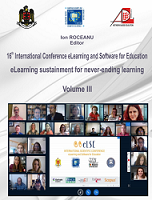MOBILE-LEARNING, MOTIVATION AND FOREIGN LANGUAGE LEARNING AT UNIVERSITY LEVEL AND AS AN EMPLOYEE. A CONTRASTIVE STUDY
MOBILE-LEARNING, MOTIVATION AND FOREIGN LANGUAGE LEARNING AT UNIVERSITY LEVEL AND AS AN EMPLOYEE. A CONTRASTIVE STUDY
Author(s): Ioan Laurian Soare, Maria-Cristina Munteanu-BănățeanuSubject(s): Foreign languages learning, Language acquisition, Higher Education , ICT Information and Communications Technologies, Distance learning / e-learning
Published by: Carol I National Defence University Publishing House
Keywords: motivation; FLL; e-learning; mobile-learning;
Summary/Abstract: Motivation plays a decisive role in foreign language learning (FLL), whereas language learning itself is a complex process influenced by a great number of internal and external/cognitive and affective factors. Researches on motivational issues and language learning have been made in the area of second language acquisition (SLA) and foreign language learning (FLL) (Gardner and Lamber, 1972). Here we can identify several types of motivation within language learning. The present study concentrates on three types of motivation (pragmatic-communicative, affective and integrative) (Mihaljevic, 1991; 1998) and focuses on FLL and mobile-learning, as a part of e-Learning. E-learning, as well as other new technologies, has enjoyed a spectacular growth in the recent years. Some decades ago, in both education and training, predictions about new forms of learning turned out to be inaccurate (Chambers, 1999), since a new branch has already made its own way within the learning universe: mobile learning. This new form of learning can be defined as the use of portable devices which include smartphones, personal digital assistants and handheld devices. It goes without saying that mobile learning is a novelty and relies on the use of wireless technology in the communication between teacher and student. This paper explores the use of mobile devices in FLL and the motivational issue in two contrastive ways: students at a state university on one hand and senior students (actually, company-employees) on the other hand. The study compares in what way mobile learning influences their motivation in acquiring a language. Different factors – such as gender, age, social environment, team work are taken into consideration. In either case there is a case study. The languages the subjects are studying are: French and German. The research involves also a determined period of time. The results showed, interestingly enough, a certain homogeneity within the groups. From a motivational point of view, there was a predominant tendency towards pragmatic-communicative motivation whereas the use of mobile learning has increased considerably enough student´s attitude towards language learning.
Journal: Conference proceedings of »eLearning and Software for Education« (eLSE)
- Issue Year: 16/2020
- Issue No: 03
- Page Range: 485-490
- Page Count: 6
- Language: English

